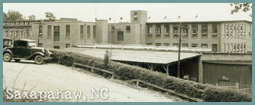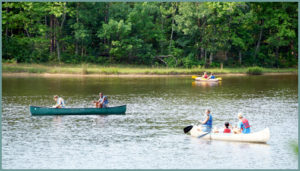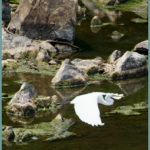The Hawbridge School was born in the minds and hearts of a group of parents and community members who wanted a personalized educational experience for the young adults of the Chapel Hill/Carrboro/Hillsborough community. Among those writing the original charter proposal were renowned charter school proponent Maureen Joy, parents of students home-schooled during their elementary school years, and professors from UNC Chapel Hill and Duke Universities. The charter was awarded in 1998, the second year of the charter school movement in North Carolina, and the school opened that August as New Century Charter High School (NCCHS).
 NCCHS was initially housed in several temporary spaces in and around Chapel Hill. In July 2003, Dr. Marcia Huth became the Director of Education, bringing a vision of academic excellence, collaborative community, and arts integration. In June 2004, the school moved into its current permanent facility – a beautifully restored mill beside the Haw River in the historic village of Saxapahaw.
NCCHS was initially housed in several temporary spaces in and around Chapel Hill. In July 2003, Dr. Marcia Huth became the Director of Education, bringing a vision of academic excellence, collaborative community, and arts integration. In June 2004, the school moved into its current permanent facility – a beautifully restored mill beside the Haw River in the historic village of Saxapahaw.
The new location, close to both the Triangle and the Triad, enabled NCCHS to expand both its student base and its curriculum. In consultation with the Sustainable Agriculture program at Central Carolina Community College in Pittsboro, faculty and students created a teaching garden where local organic farmers worked with the students, selling what was not used for school lunches at local markets.
From 2004-2008, Dr. Huth and the faculty focused on growing the school’s curriculum to fit the students and the  community. The proximity to the Haw River and the 300-acre Saxapahaw Lake made it possible for canoeing and kayaking instructor Joe Jacob, owner of The Haw River Canoe and Kayak Co., to teach classes in paddle sports and outdoor skills. Lisa Furukawa founded the music program and formed an orchestra; Japanese became a language and cultural studies focus, and textile design and production further expanded the arts focus of the school.
community. The proximity to the Haw River and the 300-acre Saxapahaw Lake made it possible for canoeing and kayaking instructor Joe Jacob, owner of The Haw River Canoe and Kayak Co., to teach classes in paddle sports and outdoor skills. Lisa Furukawa founded the music program and formed an orchestra; Japanese became a language and cultural studies focus, and textile design and production further expanded the arts focus of the school.
The State Board of Education approved the school’s name change to “The Hawbridge School” at its August 2007 meeting. Soon thereafter, with help from area environmentalists and Dr. Douglas Crawford-Brown, director of the Institute for the Environment and chair of the Environmental Studies program at UNC Chapel Hill, the school initiated a focus on environmental studies. Students and faculty investigate the environment from both natural science and social science perspectives, taking inspiration from conservationist Aldo Leopold’s definition of “Land Ethic.”
All ethics so far evolved rest upon a single premise: that the individual is a member of a community of interdependent parts,” he wrote. “That land is a community is the basic concept of ecology, but that land is to be loved and respected is an extension of ethics…. The land ethic enlarges the boundaries of the community to include soils, waters, plants, and animals, or collectively: the land.
Indeed, at The Hawbridge School, stewardship of the environment is considered a problem of ethics. From 2007 to 2009, Ph.D. candidates from the UNC Chapel Hill Philosophy Department conducted ethics classes around this topic several times each semester. Engaged with their natural environment as well as the rich history of the community, students thrived. Today, the school’s distinguished faculty works collaboratively to design exciting and relevant interdisciplinary units rooted in this thoughtful, rigorous, problem-solving model.
Hawbridge’s graduates have continued their education at prestigious colleges and universities, including UNC Chapel Hill, NC State, Carnegie Mellon, University of Chicago, the University of Virginia, Sarah Lawrence and Boston College. Each year, graduates return to express gratitude for the small, supportive community that provided the foundation for success in college and beyond.
The current university-quality faculty of teachers hold doctoral, master’s, and double undergraduate degrees, many with distinction. In recent years, the school has added a theater program, a writing program, and a gamelan orchestra with original, recycled instruments and student compositions. Hawbridge continues to add new AP courses each year, and students have won state and national awards through Envirothon and the Scholastic Art and Writing Program. The academic focus has resulted in an Honor School of Excellence distinction.
with distinction. In recent years, the school has added a theater program, a writing program, and a gamelan orchestra with original, recycled instruments and student compositions. Hawbridge continues to add new AP courses each year, and students have won state and national awards through Envirothon and the Scholastic Art and Writing Program. The academic focus has resulted in an Honor School of Excellence distinction.
In accordance with Federal law and U.S. Department of Agriculture policy, this institution is prohibited from discriminating on the basis of race, color, national origin, age, disability, religion, sex, familial status, sexual orientation, and reprisal. (Not all prohibited bases apply to all programs).
